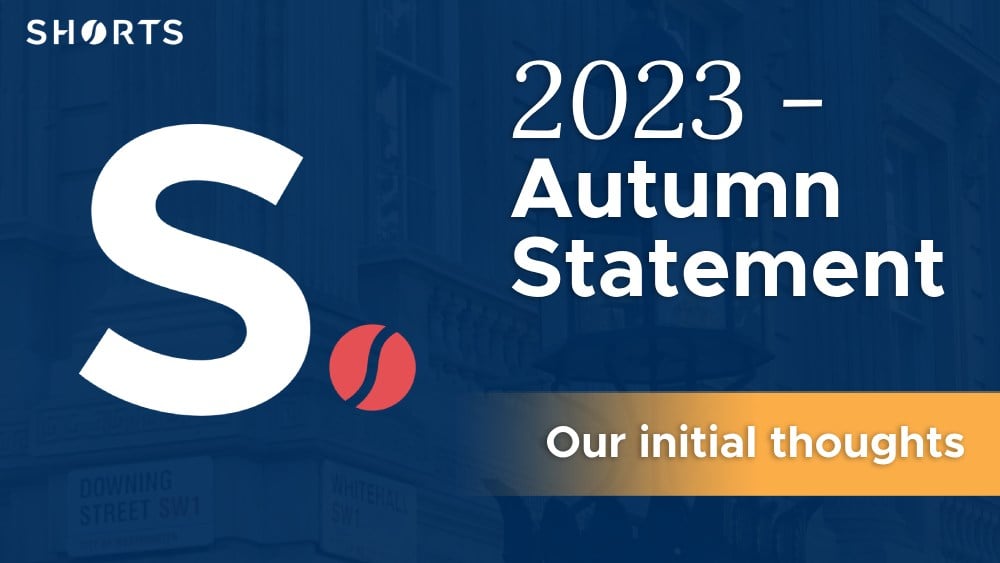
There were a few simple headline changes to taxes announced today by Jeremy Hunt in his Autumn Statement speech; with little additional detail being provided in the detailed analysis subsequently released by HMRC and The Treasury.
A summary is provided below of the key issues.
Perhaps surprisingly, there were no major announcements in respect of Inheritance Tax (IHT) or Income Tax, as was widely reported by the press in the run up. We will provide further analysis as the dust settles and further interpretation and clarification are obtained.
National Insurance
The change that will affect the largest number of people is the reduction in National Insurance for employees with earnings within the main NI band, where the rate will drop from 12% to 10%. This will be worth up to £62.83 per month to employees. Interestingly, this will be introduced from 6 January 2024 rather than 6 April.
For the self-employed, the rate of National Insurance payable on profits falling within the main band will be reduced from 9% to 8%, a saving of up to £31.42 per month.
In addition, Class 2 National Insurance, which was payable at a flat rate of £3.45 per week, will be removed from the 2024/25 tax year, although the Chancellor stated that they would retain their credit record and benefit entitlement.
Corporation Tax
“Full expensing”, which provides companies with full tax relief on qualifying capital expenditure, was initially to run for a limited period, but it was announced that this will be made permanent.
Whilst the Chancellor claimed that this would be the “largest business tax cut in modern British history” it will also only be helpful to the largest companies with capital expenditure in excess of £1m per annum since most companies receive full tax relief for their expenditure anyway via the Annual Investment Allowance. It may, however, encourage multi-national groups to locate or grow their presence in the UK.
Investment Zones and Freeports
Further regional Investment Zones were announced, and the period for which Freeports will be entitled to tax reliefs is extended from 5 to 10 years.
Research & Development (R&D) schemes
The proposed move to one simplified R&D tax relief scheme, announced as draft legislation in the Spring Budget, will come into effect from 1 April 2024. This involves merging the SME and RDEC schemes into one RDEC scheme plus a separate scheme for R&D-intensive companies.
The RDEC rates currently in place from 1 April 2023 of 20% of R&D expenditure with no enhancement will remain and, based on a corporation tax rate of 25%, provide net relief of 15% (£15,000 for every £100,000 spent on R&D). However, if you are a loss-making company, the 25% tax rate is reduced to 19%, meaning the net relief is worth 16.2% of R&D expenditure (£16,200 for every £100,000 spent on R&D).
Draft legislation was also announced in the Spring Budget for R&D Intensive companies, which is where 40% of total company expenditure is spent on R&D. This has now been revised to 30% and will also include a measure where if you qualify in year 1, you will also qualify in year 2 even if you dip below 30%. These companies will also benefit from the 86% enhanced R&D deduction and be able to surrender losses at 14.5% - this gives net relief of 26.97% (£26,970 for every £100,000 spent on R&D).
Cash accounting
Small unincorporated businesses are entitled to use the cash basis of accounting (calculating their profits based on cash receipts and payments) as an alternative to the accruals basis (as used by larger businesses and companies, which recognises income when it is earnt and costs when they are incurred regardless of when payments are actually made).
From April 2024 the cash basis will become the default for any unincorporated business, with the current turnover limit of £300,000 removed, although they can choose to continue to use the accruals basis if they prefer. Businesses choosing to move to cash accounting will have to be wary of transitional adjustments necessary when they make the change.
Making Tax Digital for Income Tax Self-Assessment
From April 2026 self-employed individuals and landlords will be required to make digital submissions of income during the course of the year. Following consultation, the government have taken on board concerns over practicality and simplicity and has, in response, announced some easing of the requirements.
Construction Industry Scheme
From 6 April 2024, the requirements relating to a contractor’s tax compliance in order to qualify for and retain Gross Payment Status will be expanded. Registrations will also move online from that date.
Audio-Visual Expenditure Credits
A call for evidence has been published with the intention of informing an extension of the scheme to encompass visual effects.

Scott Burkinshaw
I am Head of Business Taxes at Shorts, where I lead our specialist Radius team focusing on R&D tax relief. As a Chartered Tax Adviser with over a decade of experience at national and international firms, I work with businesses and their owners to provide strategic corporate and personal tax advice. My expertise includes R&D tax relief, business disposals and acquisitions, and long-term tax planning, helping clients achieve their goals in the most efficient way.
View my articlesTags: Private Client, Business Taxes
